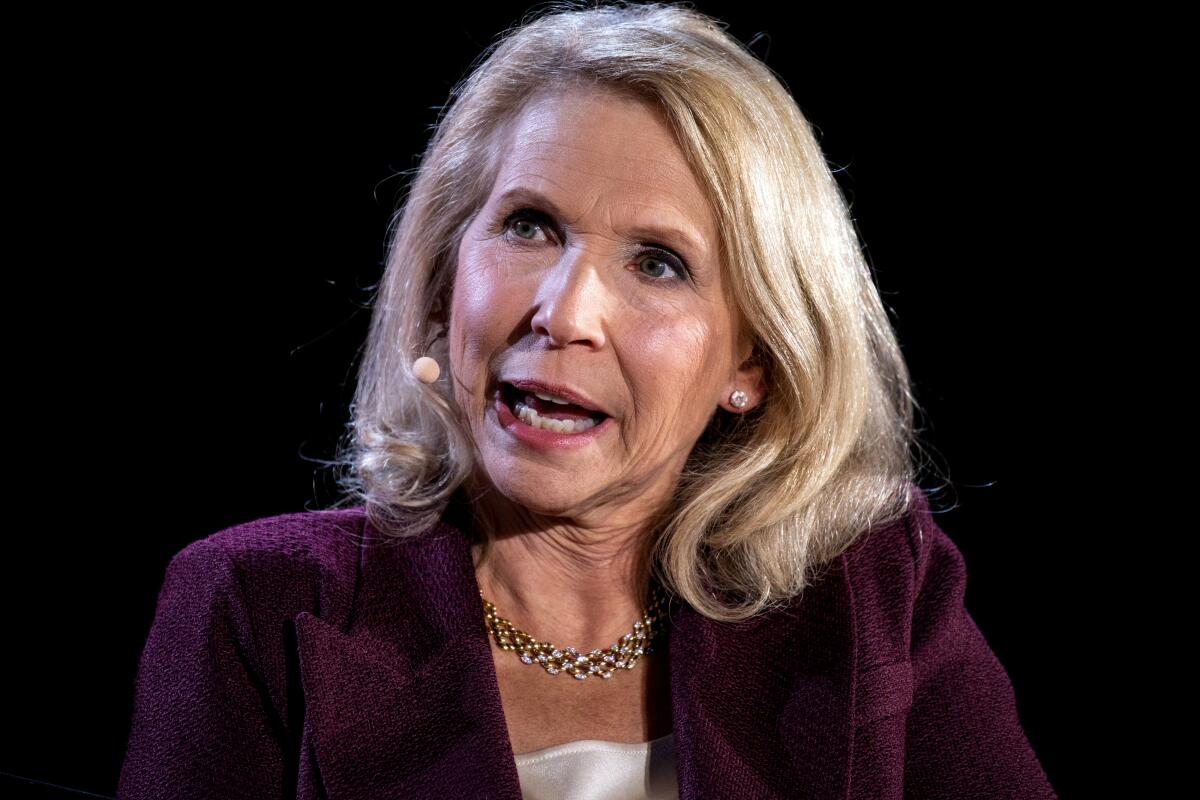Just when the $8.4-billion deal for David Ellison’s Skydance Media to buy Paramount Global was gliding toward the finish line, Shari Redstone’s roller-coaster sale took another sharp turn.
Seagram liquor company heir Edgar Bronfman Jr. this week persuaded Paramount’s independent board members to consider his rival bid for the Redstone family’s investment firm, National Amusements Inc., and a minority stake in Paramount. After spending weeks rounding up investors, Bronfman submitted his proposal late Monday — two days before the bidding window closed — and then sweetened the offer to $6 billion.
Now the stage is set for more jockeying until Paramount’s Sept. 5 deadline to decide who will win the beleaguered media company that owns CBS, Comedy Central, Nickelodeon, MTV and the historic Melrose Avenue film studio.
“This has been a very strange process,” Charles Elson, founding director of the Weinberg Center for Corporate Governance at University of Delaware, said Friday. “This company has provided more ‘theater’ than any other company I can think of. … It’s just remarkable that here we are.”
Paramount’s decision to extend the deadline for Bronfman did not sit well with the Skydance team.
Skydance’s lawyers sent a terse letter to Paramount’s special committee of independent directors Thursday, accusing them of violating the terms of Skydance’s agreement to buy National Amusements and Paramount, according to three people familiar with the letter who were not authorized to discuss it.
Bronfman’s bid isn’t expected to derail the Skydance deal, according to the knowledgeable people.
But there are risks to Paramount’s late-in-the-game flirtation with another suitor.
“It’s not cost-less to do this,” said Melissa A. Schilling, a management professor at New York University’s Stern School of Business. “It is creating conflict with Skydance and, should they prevail, they are going to come in angry. That’s not a great way to start a marriage.”
Edgar Bronfman Jr. in 2019.
(Michael Kovac / Getty Images)
Representatives of Redstone, Paramount, Bronfman and Skydance declined to comment.
Bronfman is trying to thread a needle created by a provision in the Skydance agreement, approved in July. The deal established a 45-day “go shop” window for Paramount’s board to solicit offers “superior” to that of Skydance.
Several sources speculated that Paramount’s board’s willingness to entertain Bronfman’s proposal stems from Redstone’s desire to protect her family from costly shareholder lawsuits. The sales process already has sparked litigation, and the Paramount directors’ efforts to beat the bushes could help demonstrate that there weren’t viable bidders beyond Skydance, helping them defend against shareholder actions.
“This process could be designed to put a check mark in the due diligence box for shareholders, saying: ‘We looked out for you,’ ” Schilling said.
There could be other motivations.
The Skydance group has deep pockets, including tech titan Larry Ellison, co-founder of Oracle Corp., and RedBird Capital Media, a decade-old firm founded by former Goldman Sachs partner Gerry Cardinale.
Paramount may also be angling for additional concessions from the Skydance group, the knowledgeable people said.
But Skydance already has sweetened its offer for Paramount and NAI — twice.
There could be continued heartburn over the terms of the Skydance deal. The major issue, according to shareholders, is the all-stock nature of the transaction and the plan to fold David Ellison’s smaller Santa Monica Skydance studio into Paramount.

Skydance Media founder and CEO David Ellison.
(Evan Agostini/Invision/AP)
Some shareholders have grumbled over the $4.75-billion valuation of Skydance, alleging the entertainment firm isn’t worth nearly that much.
Skydance co-owns some of the Paramount studio’s biggest blockbusters, including “Mission: Impossible,” “Top Gun: Maverick” and “Star Trek.” Ellison’s company also has been building an animation studio under John Lasseter, former Pixar creative executive.
Some investors complain that the deal undervalues the holdings of Paramount shareholders while overvaluing Skydance, further diluting the value of Paramount’s stock.
That’s a scenario that played out with the disastrous AOL-Time Warner merger a quarter of a century ago, Schilling said.
“One of the things the AOL-Time Warner deal taught us is that the company that is initiating the transaction may be overvalued,” Schilling said. “AOL’s stock was valued super high because that was at the peak of the internet bubble. And AOL was able to turn a bunch of unrealized capital gains into cold hard assets.”
Skydance won support of Paramount’s board, in large part, by carving out $4.5 billion to buy shares from Paramount investors, including nonvoting Class B shares at $15 a share.
Bronfman scrambled to identify funds — a proposed $1.7-billion set-aside — to offer Class B investors $16 a share.
Both bids would inject $1.5 billion into Paramount’s battered balance sheet, allowing the firm to pay down debt, when the deal closes. Federal regulators must weigh in, a process that’s expected to take about a year.
In addition, Bronfman said he would match Skydance’s proposal to buy out National Amusements for $2.4 billion. Once the firm’s debts of about $650 million are paid, the Redstone family would come away with $1.75 billion.
The late Sumner Redstone made sure the company, formerly known as Viacom, had two classes of stock, allowing his family to keep a tight grip. The Redstones, through National Amusements, own 77% of Paramount’s voting Class A shares.
But the bulk of the equity is held by nonvoting Class B shareholders — and that’s the problem, Elson said.
“The controlling shareholder can move on their own whim as opposed to doing what other shareholders would agree to,” Elson said.

Shari Redstone.
(Martina Albertazzi / Bloomberg via Getty Images)
“Go shop” provisions are infrequent during competitive auctions but are fairly common for the sale of financial firms or privately held companies, Schilling said.
Skydance has the ability to match the terms of Bronfman’s deal.
Most observers believe Bronfman has an uphill battle to wrest the deal away from the Ellisons.
“We simply cannot fathom why Bronfman (and components of his investor group) would be pursuing Paramount this aggressively unless the Redstones and members of the Paramount Special Committee wanted him to,” media analyst Richard Greenfield of Lightshed Partners wrote in a report earlier this week.
“Maybe the Redstones have had second thoughts about selling to Skydance/Ellison?” Greenfield wrote.




